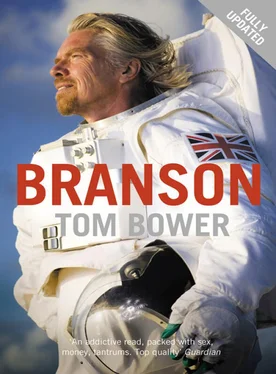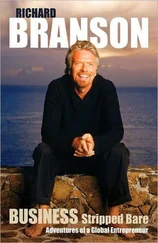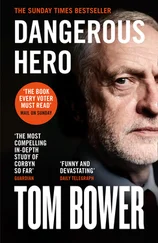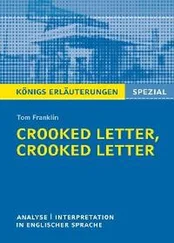Over Sunday lunch at the manor with his staff after his arrest, Branson expounded his credo. ‘We weren’t doing any harm,’ he said. ‘No one was hurt. Customs is only an organisation. If organisations get robbed, it’s not a problem because they’ve got lots of money. Too much money, which should be handed around.’ Listening to his own espousal of the morality of the righteous underdog, Branson warmed to his theme. Hitting the big boys was justifiable because they were pirates and doing harm to the small people like Virgin. Lying was virtuous if a ‘non-profit’ group helping society was the beneficiary. His cabal did not disapprove. Deceit, they agreed, was acceptable in business. His forgery of a letter and an invoice from a non-existent American company to suggest that he was an innocent victim in the sale of bootleg records defied contradiction. Surrounded by employees who approved his dishonesty, Branson was classed as a rebel thumbing his nose at the Establishment. Taking money from the government, they agreed with Branson, was a lark and, considering all the rogues in the City, lying was not only acceptable but virtuous for the ‘victim’ and the ‘champion of youth’.
The first ruse was simple and saved money. ‘Operator,’ berated the grating upper class voice, ‘I’ve put money into this pay phone and it hasn’t worked.’
‘Sorry, sir, I’ll connect you.’
The second ruse, spoken from the telephone box, was more sophisticated. ‘I’m Richard Branson. I’m eighteen and I run a magazine called Student that’s doing something really useful for young people.’ The caller was sixteen and Student was no more than an idea.
The third ruse was crude. The impatient bearer of six mediocre ‘O’ level passes, who had cheated in exams by secreting a crib sheet in the palm of his left hand, proposed that his father should write to Stowe’s headmaster explaining that his son wanted to prematurely leave the school to study law at university and enter politics. In fact, unwilling to study either for ‘A’ levels or a university degree, Richard Branson wanted to launch Student magazine. Ted Branson refused to lie but reluctantly agreed his son should leave the school. Thirty years later, journalists would, after interviewing the tycoon, mistakenly believe that the teenager had left Stowe because ‘ Student magazine was successful’. The youth’s precocious confidence to make his fortune without an education owed much to an unusually dominant mother’s extraordinary gestures.
‘Find your own way home, Ricky,’ ordered Eve Branson as she pushed her four-year-old son from the car into the Surrey countryside. The mother’s lovingly reckless bravado was intended to ensure that her only son should not emulate her husband’s lacklustre career. Success as a barrister had eluded Ted Branson, despite his father’s bequest of Halsbury’s Laws of England. Eve willed her adored son to surpass Ted’s modest achievements. Maintaining the appearance of Establishment gentility was important. Dressing up and placing herself as the centre of attraction at endless social parties, Eve Branson distracted neighbours from the family’s dependence on second-hand clothes for her children and her sale of wooden tissue boxes to supplement the family’s limited finances. An extrovert and attention-seeker, she taught her son the power of presentation and self-publicity, and gave him the infallibility of fearless independence.
Eve Branson aspired to rekindle the fortunes of her family, the Flindts, one hundred and fifty years earlier. Gustavus Flindt had arrived in Britain from Hamburg to work as a broker on the Baltic Exchange. Julius Flindt, one of his ten children, in turn also became a broker, as did one of Julius’s sons and a grandson, until Eve’s father broke the tradition after fighting in the First World War against his forefather’s kinsmen. In Richard Branson’s parents’ marriage, the Flindts’ trading tradition was blended with the Establishment bias of the Bransons, educated at Bedford Grammar School and in medicine or law at Cambridge. Ted Branson’s father, the Right Honourable Sir George Branson, a High Court judge, had been appointed a Privy Councillor in 1940. His grandfather and great-grandfather had been a publisher and a lawyer in India. Eve had every hope that the combination would guarantee upper-middle class Establishment respectability. Her ambitions for her only son were loftier still.
‘Ricky’s going to be prime minister one day,’ she frequently glowed. ‘Nothing but the top,’ the aspiring parent would assert, ‘is good enough.’ Neighbours recall her position under a high tree in the centre of Shamley Green which had attracted stern warnings by all the other parents, forbidding their children to climb beyond a low height. ‘Right to the top,’ urged Eve Branson as her son perilously balanced on the highest branches. ‘Higher,’ shouted the woman famous for hyperactively urging, ‘Do something, Ricky.’ Eve Branson’s emotional exhortations created an obedient son convinced he could do no wrong and that self-doubt was a sin. ‘Shyness is very selfish,’ the mother regularly admonished. ‘It means you are only thinking of yourself.’ Her son, born on 18 July 1950, was not shy but he was awkward and inarticulate. Unable to express himself, he disguised his limitations with nervous gestures and stunts to attract attention, usefully camouflaging his lust for fame and fortune. Earning money, an unmentioned topic in the polite society of the early sixties, became his dominant preoccupation. He disdained authority and intellectuals. So long as his adoring mother approved of his behaviour, he was impervious to criticism.
‘Books, no way,’ Branson laughed, reflecting the family’s lack of interest in culture and education. ‘I don’t listen to music either.’ Ricky was a doer, not an observer excited by intellectual stimulation. Full of his mother’s forceful prediction of his destiny, he naturally dreamed of glory. ‘Bringing him up was rather like riding a thoroughbred horse,’ chuffed Eve Branson. ‘He needed guiding but you were afraid to pull the reins too hard in case you stamped out the adventure and wildness.’
Some of her son’s contemporaries at Stowe were intolerant of his exceptional qualities. The most critical lampooned ‘Greasy Branson’ as a self-centred big-head suffering oily, pimply skin with a smarmy manner towards teachers. But the majority accurately surmised that Branson’s diffident charm was exceptional. Since Stowe was a second-rate public school, it was not difficult to shine, especially after the sixteen-year-old boasted about his introduction to a prostitute by his father. Thirty years later, the former schoolboys could still recall Branson’s vivid account of a trip to Soho and the introduction to a woman paid by his father to remove the stigma of virginity. Sex, in every sense, was his obsession.
He suffered only two genuine handicaps: a knee injury which destroyed his enjoyment of sport, and slight dyslexia. Despite those impediments and his rejection of books, Branson surprisingly won the school’s Gavin Maxwell prize for writing the best English essay. Gavin Young, a well-known newspaper journalist, personally awarded the prize to Branson. Over lunch, Branson listened to Young’s description of a journalist’s glamorous lifestyle: a good income earned by interviewing celebrities in exotic locations. It was an attractive cocktail which matched his preoccupations: money, sex and fame. Branson was reminded of his discussions with a school friend about Student , their proposed magazine for sixth formers, similar to two new magazines, International Time and Oz. While others only talked about the idea, Branson’s energetic self-confidence could make Student a reality.
Читать дальше












